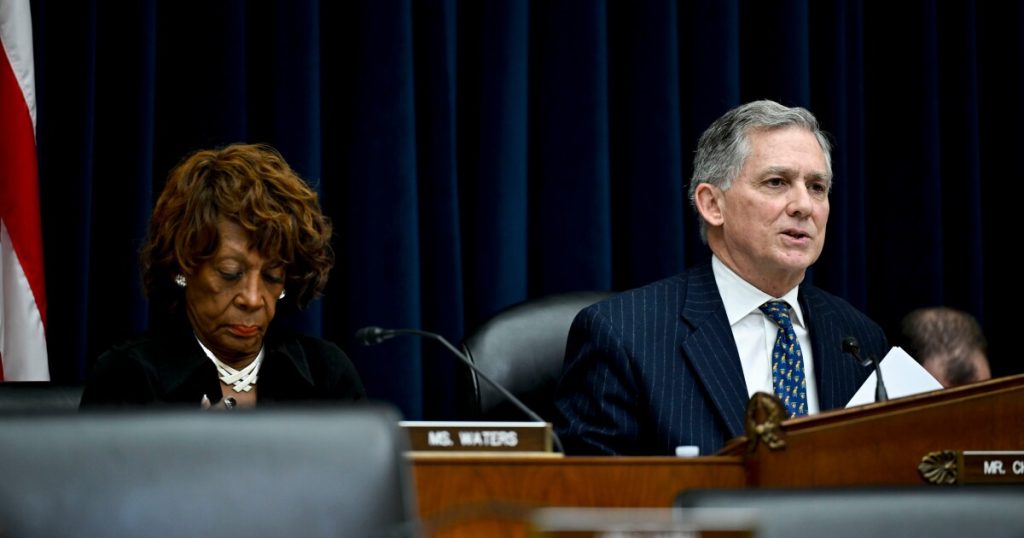Bloomberg News
The House Financial Services Committee on Wednesday passed a slew of bank supervisory and regulatory bills, including measures that would set timelines for regulators’ approval of mergers, limit regulators’ ability to make reputational risk determinations and establish an appeals process for supervisory determinations.
The measures passed after a marathon two-day markup of more than 20 bills, many of which were passed with broad bipartisan support.
“Every bill under consideration today is aimed at strengthening our economy, supporting American consumers and businesses, and ensuring that our banking and capital market system — especially our community banks — remain strong,” committee Chair French Hill, R-Ark., said at the beginning of Tuesday’s markup. “Today is an opportunity to ensure that the United States remains the global leader in financial innovation and opportunity.”
Merger reviews
Among the bills adopted Wednesday was
“Mergers and acquisitions help community and regional banks grow into new markets, expand their services and achieve the economies of scale necessary to compete in a modern financial marketplace and provide lower costs and more innovative financial services and products,” Barr said. “Regulatory indecision on merger applications impedes these beneficial outcomes. When responsibly executed, mergers don’t stifle competition; they actually strengthen it.”‘
Committee ranking member Maxine Waters, D-Calif., said the bill would eliminate the Fed’s opportunity to consider all stakeholders’ input before the 90-day deadline and effectively force the central bank to approve mergers, which could have considerable effects on competition and thus consumer choice.
“This bill would limit the Fed’s ability to consider feedback from the public or affected stakeholders on proposed mergers. This is a dangerous rollback of critical safeguards designed to protect consumers,” Waters said. “H.R. 1900 would undoubtedly make it harder for banking supervisors to ensure safety and soundness across the system, especially in the face of growing complexity and risk among mega banks. At its core, this is an anti-competitive bill.”
The measure passed along partisan lines by a vote of 29-21.
Supervisory examinations
The committee also passed
The bill, introduced by Hill, would require federal regulators to complete their regular bank examinations within 270 days of beginning the review and to issue a report to the bank within 90 days of an exit interview with bank management after an examination has concluded.
The measure passed with bipartisan support, 35-17.
Supervisory appeals
H.R. 970 creates a process for banks seeking to enter a new business line or expansion to either obtain a written non-objection letter from their regulator or detailed explanation for why the proposed business line or expansion violates rules or law.
The bill also creates a process for banks to challenge those legal explanations and a three-member Office of Independent Examination Review within the Federal Financial Institutions Examination Council tasked with reviewing supervisory complaints from banks and credit unions, with members chosen by the president and serving three-year terms.
Hill said a supervisory appeals process was created with the passage of the Riegle Community Development and Regulatory Improvement Act of 1994, which was itself passed in the wake of the Savings and Loan crisis of the 1980s and early 1990s. But the mechanisms put in place have not given banks a meaningful opportunity to challenge supervisory determinations, and his bill would right that wrong.
“While each agency since has implemented some version of the appeals process, the reality is, these processes don’t work,” Hill said.
“In a recent hearing of the financial institution subcommittee, we heard expert testimony detailing … lack of independence, insufficient oversight, fear of retaliation and conflicts of interest within the appeals framework,” he said. “As a result, few institutions are willing to pursue appeals — and of those that do, even fewer are successful in overturning supervisory findings.”
Rep. David Scott, D-Ga., offered an amendment allowing no more than two members of the Office of Independent Examination Review to be of the same party. That amendment was adopted unanimously, 52-0.
Higher asset thresholds
The committee also passed
Rep. Barry Loudermilk, R-Ga., said the legislative threshold of $10 billion is too low to allow smaller banks to grow, or alternatively requiring them to grow too quickly to obtain the economies of scale required to meet the regulatory requirements that come with exceeding $10 billion of assets.
The bill passed by a vote of 29-23, along partisan lines.
“Instead of maintaining a healthy rate of growth, many banks linger around these thresholds, afraid to cross them because of the … regulatory requirements that they face on the other side,” Loudermilk said. “The system doesn’t punish unhealthy risk taking — it punishes growth. It keeps the small guys small, and the big guys get even bigger, with ever shrinking room for a healthy competition in the middle.”
Waters objected to the measure, saying it raised asset thresholds for things like the Volcker Rule ban on proprietary trading or the Qualified Mortgage rule, both of which were enacted after the global financial crisis of 2008 to protect consumers.
“Let me be clear: by no means is $50 billion in assets a small bank,” Waters said. “These are large institutions with significant footprints in our financial system. Only 2% of banks and credit unions currently exceed the $10 billion threshold. Of those, 70% fall between $10 billion and $50 billion, meaning this bill would gut oversight for the vast majority of large institutions subject to these consumer and safety protections.”
HUMPS and other legislation
The committee also passed

